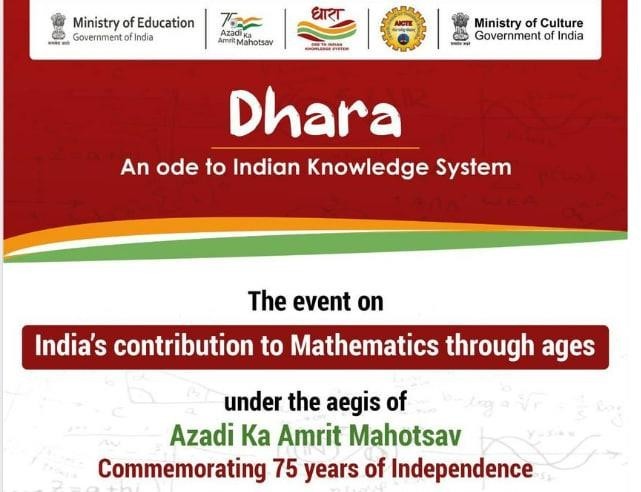Description

Copyright infringement not intended
Context: The Ministry of Culture celebrated the first anniversary of the “Dhara: Ode to Indian Knowledge Systems” initiative under the Azadi Ka Amrit Mahotsav.
More about the project
- Dhara is a depiction of the concept of a "continuous flow" of knowledge and wisdom from one age to the next, being adopted, challenged, and modified over time so that we not only progress to the next level of understanding across various fields, but do so using the strength of the work that is already available to us from our past.
- The programme has been effective in increasing public awareness, involving stakeholders, and developing a framework for the promotion and restoration of numerous Indian Knowledge Systems fields throughout its year-long activities.
- The program was created as a combination of lectures and discussions focused on the specific subject matter while highlighting India's achievements in civilization.
- The key execution partner for Dhara programs is the Indian Knowledge Systems (IKS) Division of the Ministry of Education.
- The Dhara initiative aimed to bring together various ministries, academics, business professionals, partners in knowledge, and other stakeholders to strengthen strategic partnerships that can further support the development of comprehensive frameworks for scientific synthesis, propagation, and protection of traditional knowledge systems while also guaranteeing its accessibility to the ordinary citizen of the country.
- DHARA consists of a series of lectures to rediscover our past and celebrate India's achievements and the contributions of its great thinkers, mathematicians, scientists, and leaders to its cultural heritage.
- The first lecture, "Mathematics in India," focused on India's contributions to mathematics over the ages.
.jpeg)
Contributions of Indian Mathematicians
- The oldest surviving text is the Sulbasutra The so-called Pythagorean theorem is explicitly stated and used, along with several other interesting surd approximations.
- Pingala’s Chandassastra lays foundations for various combinatorial techniques.
- Aryabhata provided descriptions of techniques based on the decimal place-value system for obtaining the square and cube roots. Also, he provided a method for solving the linear indeterminate problem as well as the differential equation of the sine function in its finite-difference form.
- Brahmagupta talked about how to do arithmetic with zero. The profound "Bhavana" law of composition for resolving quadratic indeterminate equations was also introduced by him.
Indian Knowledge System
- Indian Knowledge System (IKS) is an innovative cell under the Union Ministry of Education (MoE).
- It is established to promote interdisciplinary research on all aspects of IKS and preserve and disseminate IKS for further research and societal applications.
- It will actively engage in spreading the rich heritage of our country and traditional knowledge in the field of Arts and literature, Agriculture, Basic Sciences, Engineering & Technology, Architecture, Management, Economics, etc.
|
PRACTICE QUESTION
Q. Which of the Following Ministry is the key execution partner for Dhara programs?
A. Ministry of Jal Shakti
B. Ministry of Women and Child Development
C. Ministry of Education
D. Ministry of Defence
Answer: C
|

https://pib.gov.in/PressReleseDetail.aspx?PRID=1903868











